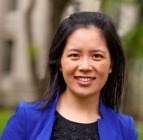Harnessing structure and algorithmic properties for scalable learning methods over networks
Speaker
Na Li, Harvard University
Abstract
Recent radical evolution in distributed sensing, computation, communication, and actuation has fostered the emergence of cyber-physical networked systems, across a broad spectrum of engineering and societal fields. One major challenge is how to shape the network collective behavior through the design of scalable decision-making algorithms for individual components. In this talk, I will present two lines of work to demonstrate how to exploit special properties for scalable solutions. First, I will present our recent scalable multiagent reinforcement learning algorithms which only use local sensing and communication yet learn nearly-optimal localized policies for the global network. The key of the algorithm design is to exploit the network connectivity property. Then I will present our limited communication distributed learning methods that compress the communicated information of a linear-convergent algorithm to a few bits while still preserving the linear convergence. The key of the compression is to exploit the linear convergence and smoothness.
First part is the joint work with Guannan Qu and Adam Wierman. Second part is the joint work with Sindri Magnusson and Hossein Shokri-Ghadikolaei
Bio
Na Li is a Gordon McKay professor in Electrical Engineering and Applied Mathematics at Harvard University. She received her Bachelor degree in Mathematics from Zhejiang University in 2007 and Ph.D. degree in Control and Dynamical systems from California Institute of Technology in 2013. She was a postdoctoral associate at Massachusetts Institute of Technology 2013-2014. She has joined Harvard University since 2014. Her research lies in control, learning, and optimization of networked systems, including theory development, algorithm design, and applications to real-world cyber-physical societal system. She serves as an associate editor for IEEE transactions on automatic control and Systems & Control Letters and has been in the organizing committees for various conferences. She received NSF career award (2016), AFSOR Young Investigator Award (2017), ONR Young Investigator Award(2019), Donald P. Eckman Award (2019), McDonald Mentoring Award (2020), along with some other awards.
Event Type
- NISS Sponsored
Sponsor
Website
Location
Policy

